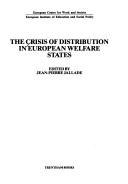| Listing 1 - 10 of 27 | << page >> |
Sort by
|
Book
ISBN: 2110890061 9782110890061 Year: 1997 Volume: 3 Publisher: [Paris] : MIRE ,
Abstract | Keywords | Export | Availability | Bookmark
 Loading...
Loading...Choose an application
- Reference Manager
- EndNote
- RefWorks (Direct export to RefWorks)
Social security --- Sécurité sociale --- Congresses --- Congrès --- Welfare state --- Sécurité sociale --- Congrès --- Welfare state - Europe
Book
ISBN: 2110890010 9782110890016 Year: 1995 Volume: 1 Publisher: S.l. Ministère de la santé publique et de l'assurance maladie
Abstract | Keywords | Export | Availability | Bookmark
 Loading...
Loading...Choose an application
- Reference Manager
- EndNote
- RefWorks (Direct export to RefWorks)
Welfare state --- Social security --- Sécurité sociale --- Congresses --- Congrès --- Welfare state - Europe
Book
ISBN: 2110890053 9782110890054 Year: 1996 Publisher: Paris Ministère du travail et des affaires sociales
Abstract | Keywords | Export | Availability | Bookmark
 Loading...
Loading...Choose an application
- Reference Manager
- EndNote
- RefWorks (Direct export to RefWorks)
Social security --- Sécurité sociale --- Comparative studies --- Congresses --- Etudes comparatives --- Congrès --- Welfare state --- Sécurité sociale --- Congrès --- Welfare state - Europe

ISBN: 0948080132 9780948080135 Year: 1988 Publisher: Stoke on Trent Trentham Books
Abstract | Keywords | Export | Availability | Bookmark
 Loading...
Loading...Choose an application
- Reference Manager
- EndNote
- RefWorks (Direct export to RefWorks)
Income --- Welfare state --- Welfare economics --- Sociological aspects --- Europe --- Economic conditions --- Welfare state - Europe --- Welfare economics - Sociological aspects - Europe --- Europe - Economic conditions - 1945 --- -Welfare state
Book
ISBN: 9782507056759 2507056754 Year: 2020 Publisher: Waterloo : Renaissance du Livre,
Abstract | Keywords | Export | Availability | Bookmark
 Loading...
Loading...Choose an application
- Reference Manager
- EndNote
- RefWorks (Direct export to RefWorks)
Le néolibéralisme anglo-saxon apporte l'émulation, l'innovation, la croissance économique et l'élévation du niveau de vie. À l'opposé, les États providence européens furent bâtis, depuis la révolution industrielle, sur les acquis sociaux, la stabilité et la solidarité du travail. La sphère marchande, désormais mondialisée et numérisée, entre en collision avec les réalités politiques de nombreux pays européens. Il en résulte une amertume sociale et des conflagrations socioéconomiques. Entre capitalisme déchaîné et égalitarisme démobilisateur, une voie médiane s'impose : il faut rebâtir l'efficacité stratégique des États européens. Cette réhabilitation est nécessaire dans de nombreux domaines, au travers d'investissements publics et de dépenses sociales : éducation, mobilité, transition climatique, financement des transferts sociaux et des soins de santé, sécurisation des services publics, etc. Il en va de la résilience d'un libéralisme qui devra intégrer les facteurs humains et climatiques dans la tempérance sociale.
Neoliberalism --- Capitalism --- Economic security --- Welfare state --- Social aspects --- Capitalisme. --- Histoire économique. --- Relations économiques internationales. --- Neoliberalism - Social aspects --- Capitalism - Social aspects --- Economic security - Europe --- Welfare state - Europe
Book
ISBN: 8884920337 9788884920331 Year: 2002 Volume: 4 Publisher: Pisa Edizioni Plus
Abstract | Keywords | Export | Availability | Bookmark
 Loading...
Loading...Choose an application
- Reference Manager
- EndNote
- RefWorks (Direct export to RefWorks)
History of Europe --- Welfare state --- History. --- Europe --- Social policy --- Historische en vergelijkende pedagogiek --- Social policy. --- Historische en vergelijkende pedagogiek. --- Denmark --- Netherlands --- Sweden --- Great Britain --- Germany --- Italy --- Belgium --- État providence --- Conditions sociales --- Social conditions --- Welfare state - Europe. --- Welfare state - Europe - History. --- Europe - Social policy --- History --- Politics --- Social security --- Book --- État providence
Book
ISBN: 9781781001264 178100126X Year: 2012 Publisher: Cheltenham Elgar
Abstract | Keywords | Export | Availability | Bookmark
 Loading...
Loading...Choose an application
- Reference Manager
- EndNote
- RefWorks (Direct export to RefWorks)
Welfare state --- Public opinion --- Social capital (Sociology) --- Europe --- Social policy --- FI / Finland - Finlande --- EEC / European Union - EU -Europese Unie - Union Européenne - UE --- 330.580 --- 202 --- Gecontroleerde economie. Geleide economie. Welvaarststaat. Algemeenheden --- Sociale organisatie --- Welfare state - Europe --- Welfare state - Europe - Public opinion --- Public opinion - Europe --- Social capital (Sociology) - Europe --- Europe - Social policy - Public opinion

ISBN: 019926726X 0199267278 1281906654 9786611906658 0191533033 9780199267262 9780199267279 Year: 2004 Publisher: Oxford Oxford university press
Abstract | Keywords | Export | Availability | Bookmark
 Loading...
Loading...Choose an application
- Reference Manager
- EndNote
- RefWorks (Direct export to RefWorks)
This book introduces the concept of new social risks in welfare state studies and explains their relevance to the comparative understanding of social policy in Europe. New social risks arise from shifts in the balance of work and family life as a direct result of the declining importance of the male breadwinner family, changes in the labour market, and the impact of globalization on national policy-making. They differ from the old social risks of the standard industriallife-course, which were concerned primarily with interruptions to income from sickness, unemployment, retirement, and similar
Social change --- Welfare state --- Changement social --- Etat providence --- #SBIB:316.8H40 --- #SBIB:35H437 --- 316.323.65 --- Sociaal beleid: social policy, sociale zekerheid, verzorgingsstaat --- Beleidssectoren: sociale zekerheid --- Verzorgingsstaat. Welvaartsstaat --- 316.323.65 Verzorgingsstaat. Welvaartsstaat --- Public welfare --- State, Welfare --- Economic policy --- Social policy --- State, The --- Welfare economics --- European Union. --- E.U. --- Europe --- Social policy. --- Public welfare - Europe --- Welfare state - Europe --- Welfare state - Europe - Case studies --- Europe - Social policy

ISBN: 0198280521 0199284024 9780198280521 9780199284023 1281147222 9786611147228 0191521140 143561920X Year: 2006 Publisher: Oxford Oxford University Press
Abstract | Keywords | Export | Availability | Bookmark
 Loading...
Loading...Choose an application
- Reference Manager
- EndNote
- RefWorks (Direct export to RefWorks)
This book provides a major new examination of the current dilemmas of liberal anti-racist policies in European societies, linking two discourses that are normally quite separate in social science: immigration and ethnic relations research on the one hand, and the political economy of the welfare state on the other. The authors rephrase Gunnar Myrdal's questions in An American Dilemma with reference to Europe's current dual crisis - that of the established welfare statefacing a declining capacity to maintain equity, and that of the nation state unable to accommodate incremental ethnic diversity
Immigrants. --- Social welfare. --- Welfare state --- Citizenship --- Etat providence --- Citoyenneté --- Europe --- Emigration and immigration. --- Ethnic relations. --- Emigration et immigration --- Relations interethniques --- Emigration and immigration --- Ethnic relations --- Burgerschap. --- Migratie (demografie) --- Verzorgingsstaat. --- Migratie (demografie). --- Citoyenneté --- #SBIB:316.8H16 --- Welzijns- en sociale problemen: migranten, rassenrelaties --- Migration. Refugees --- Sociology of minorities --- Social policy --- European Union --- 4.200. --- Welfare state - Europe --- Citizenship - Europe --- Europe - Emigration and immigration --- Europe - Ethnic relations
Book
ISBN: 1472439325 1322433631 1472439333 1317117069 9781472439338 1317117077 9781472439345 1472439341 9781322433639 9781472439321 9781317117070 9781317117063 9781315588421 9781317117056 9780415789653 0415789656 1315588420 Year: 2014 Publisher: Farnham, Surrey, UK Burlington, VT
Abstract | Keywords | Export | Availability | Bookmark
 Loading...
Loading...Choose an application
- Reference Manager
- EndNote
- RefWorks (Direct export to RefWorks)
Conventional wisdom says that Europe's crisis is a financial crisis. But is this really the case? In Industrial Poverty, economist Sven R. Larson, challenges this view and suggests instead that Europe is in a state of permanent economic decline. Using Sweden in the 1990's as an example, he shows how a welfare-state crisis combined with the wrong kind of austerity policies replaces prosperity with industrial poverty. Today, Europe is going through the same transition into industrial poverty. Tomorrow, it could be the United States, unless Congress and the President take decisive action against
Economic development -- Europe. --- Europe -- Economic conditions -- 21st century. --- Europe -- Economic policy. --- Europe -- Social policy. --- Financial crises -- Europe. --- Welfare state -- Europe. --- Economic development --- Financial crises --- Welfare state --- Business & Economics --- Economic History --- Europe --- Economic conditions --- Social policy. --- Economic policy. --- Development, Economic --- Economic growth --- Growth, Economic --- Council of Europe countries --- Economic policy --- Economics --- Statics and dynamics (Social sciences) --- Development economics --- Resource curse --- Eastern Hemisphere --- Eurasia --- E-books
| Listing 1 - 10 of 27 | << page >> |
Sort by
|

 Search
Search Feedback
Feedback About UniCat
About UniCat  Help
Help News
News